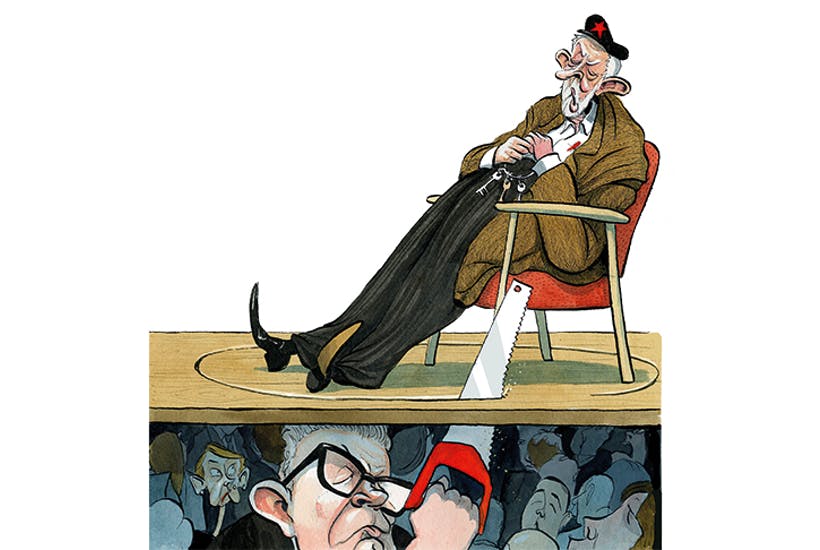The best way to understand the chaos engulfing the start of the Labour party conference is by looking at the instability of Jeremy Corbyn’s leadership. Even if this is not immediately obvious from the outside (which, with such terrible personal poll ratings for Corbyn, it should be), it is the underlying factor in yesterday’s attempt to abolish Tom Watson, and in the resignation of Andrew Fisher, the leader’s policy chief.
Fisher isn’t a Labour man through and through: he endorsed a Class War candidate standing against Labour in the 2015 election. But he is – or was – a Corbyn man through and through. He was involved in the first leadership campaign that sent the obscure backbencher rocketing into power. He was the brains behind the 2017 manifesto that attracted so many people to the Labour party. He had spent months planning policy announcements for this week’s conference in Brighton. This morning, the Sunday Times reveals Fisher is quitting, saying in a memo to colleagues that he’ll stay if there’s an autumn election, but will be gone shortly after. His public reasons for going are that he needs to give his family more time. But in a memo leaked to the Sunday Times, he claims he doesn’t think Corbyn can win, and expresses disgust at the leader’s office, which he says now contains a ‘lack of professionalism, competence and human decency which I am no longer willing to put up with’. He also complains – apparently without irony – about a ‘class war’ at the top of the party, and alleges that Corbyn’s team drafted a tweet responding to the Russian bombings of hospitals in Idlib which instead condemned US action in Syria.
Fisher’s resignation casts further light on the deep tensions in the leader’s office, which Corbyn himself seems incapable of resolving. There are at least five people close to the leader with five different strategies for the party. Other aides complain about the stranglehold of Karie Murphy and Seumas Milne. Corbyn has long been seen as malleable. But what has changed is that his own allies on the hard left now see him as replaceable. Some fear he might have personally had enough of being leader. Others think he should quit because he is such a barrier to the party being able to take over in the wake of a move against Boris Johnson.
That’s why there was an attempt to oust Watson yesterday. If Corbyn were to leave the leadership, then Watson would automatically step in as acting leader. The hard left does not want this, given Watson has increasingly defined himself against Corbyn, and has been building up a power base of MPs hostile to the current leadership. He would begin the undoing of the Corbyn project. Similarly, the abolition of Labour Students means there is now not a noisy anti-Corbyn force in the membership, which will come in handy if there is a leadership contest soon.
Further evidence of the belief that the current leader’s days are numbered comes from the ever-less-subtle beauty contest in the shadow cabinet to succeed him. Emily Thornberry, who acts as a weathervane for the power of a political leader, was once an unstinting ally. Now she is publicly pushing Corbyn to back Remain. Sir Keir Starmer, similarly, is going off-piste.
Of course, this instability around Corbyn is exactly what Watson and his allies have been planning for, something I set out in my cover piece for the Spectator in July. There was never a plan for Watson or one of the MPs around him to be seen to be wielding the knife. Instead, the hope has been that Corbyn will find it impossible to continue, and will go of his own accord. This is the plot that has been keeping many ‘moderate’ Corbyn opponents in the party, as they hope there is something left of Labour that they can recover. The left hasn’t failed to notice this plot, hence its work on the NEC in recent days. The fight in the party now is over which faction can wrestle their way to the helm of the ship and stop it from sinking.







Comments